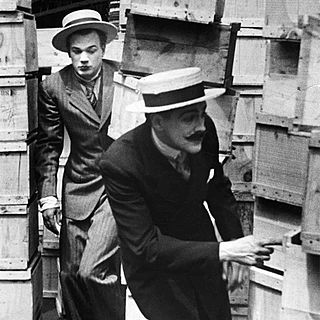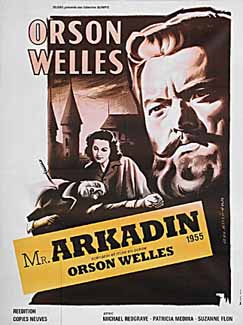Related Research Articles

Citizen Kane is a 1941 American drama film directed by, produced by, and starring Orson Welles. He also co-wrote the screenplay with Herman J. Mankiewicz. The picture was Welles' first feature film. Citizen Kane is frequently cited as the greatest film ever made. For 50 consecutive years, it stood at number 1 in the British Film Institute's Sight & Sound decennial poll of critics, and it topped the American Film Institute's 100 Years ... 100 Movies list in 1998, as well as its 2007 update. The film was nominated for Academy Awards in nine categories and it won for Best Writing by Mankiewicz and Welles. Citizen Kane is praised for Gregg Toland's cinematography, Robert Wise's editing, Bernard Herrmann's music, and its narrative structure, all of which have been considered innovative and precedent-setting.

George Orson Welles was an American actor, director, producer, and screenwriter who is remembered for his innovative work in film, radio, and theatre. He is considered to be among the greatest and most influential filmmakers of all time.

Touch of Evil is a 1958 American film noir written and directed by Orson Welles, who also stars in the film. The screenplay was loosely based on the contemporary Whit Masterson novel Badge of Evil (1956). The cast included Charlton Heston, Janet Leigh, Joseph Calleia, Akim Tamiroff and Marlene Dietrich.

Too Much Johnson is a 1938 American silent comedy film written and directed by Orson Welles. An unfinished film component of a stage production, it was made three years before Welles directed Citizen Kane, but it was never publicly screened. It was shot to be integrated into Welles's Mercury Theatre stage presentation of William Gillette's 1894 comedy, but the film sequences could not be shown due to the absence of projection facilities at the venue, the Stony Creek Theatre in Connecticut. The resulting plot confusion reportedly contributed to the stage production's failure.

Mr. Arkadin, known in Britain as Confidential Report, is a French-Spanish-Swiss coproduction film, written and directed by Orson Welles and shot in several Spanish locations, including Costa Brava, Segovia, Valladolid and Madrid. Filming took place throughout Europe in 1954, and scenes shot outside Spain include locations in London, Munich, Paris, the French Riviera and at the Château de Chillon in Switzerland.

Joseph McBride is an American film historian, biographer, screenwriter, author and educator. He has written numerous books including biographies of notable film directors, a book on screenwriting, an investigative journalism book on the JFK assassination, and a memoir of the dark years in his life.
The Hearts of Age is an early film made by Orson Welles. The film is an eight-minute short that he co-directed with friend William Vance in 1934. The film stars Welles's first wife, Virginia Nicolson, and Welles himself. He made the film while still attending the Todd School for Boys in Woodstock, Illinois, at the age of 19.

The Magnificent Ambersons is a 1942 American period drama written, produced, and directed by Orson Welles. Welles adapted Booth Tarkington's Pulitzer Prize–winning 1918 novel, about the declining fortunes of a wealthy Midwestern family and the social changes brought by the automobile age. The film stars Joseph Cotten, Dolores Costello, Anne Baxter, Tim Holt, Agnes Moorehead and Ray Collins, with Welles providing the narration.
Moby Dick is a two-act drama by Orson Welles. The play was staged June 16–July 9, 1955, at the Duke of York's Theatre in London, in a production directed by Welles. The original cast included Welles, Christopher Lee, Kenneth Williams, Joan Plowright, Patrick McGoohan, Gordon Jackson, Peter Sallis, and Wensley Pithey. The play was published by Samuel French in 1965.

The Other Side of the Wind is a 2018 satirical drama film, directed, co-written, co-produced and co-edited by Orson Welles, and posthumously released in 2018 after 48 years in development. The film stars John Huston, Bob Random, Peter Bogdanovich, Susan Strasberg, and Oja Kodar.
"The Third Man Theme" is an instrumental written and performed by Anton Karas for the soundtrack to the 1949 film The Third Man.
The Orson Welles Show was an unsold television talk show pilot directed by Orson Welles. It has never been broadcast or released in its entirety. Filming began in September 1978 and the project was completed around February 1979. It ran 74 minutes and was intended for a 90 minute commercial time slot.

Orson Welles (1915–1985) was an American director, actor, writer, and producer who is best remembered for his innovative work in radio, theatre and film. He is widely considered one of the greatest and most influential filmmakers of all time.

The Fountain of Youth is a 1956 television pilot directed by Orson Welles for a proposed Desilu Productions anthology series that was never produced. Based on a short story by John Collier, the short film narrated onscreen by Welles stars Dan Tobin, Joi Lansing and Rick Jason. The Fountain of Youth was televised once, on September 16, 1958, on NBC's Colgate Theatre. It received the prestigious Peabody Award for 1958, the only unsold television pilot ever to be so honored.
Don Quixote is an unfinished film project written, co-produced and directed by Orson Welles. Principal photography took place between 1957 and 1969. Test footage was filmed as early as 1955, second-unit photography was done as late as 1972, and Welles was working on the film intermittently until his death in 1985. The film was eventually edited by Jesús Franco and was released in 1992, to mixed reviews.
The Deep is an unfinished film directed by Orson Welles, based on Charles Williams' novel Dead Calm (1963), which was later adapted as an eponymous 1989 film. Welles produced and wrote The Deep, as well as played the role of Russ Brewer opposite Jeanne Moreau and Laurence Harvey.
Vienna is a 1968 short film directed by Orson Welles. It was originally produced as part of his abandoned television special, Orson's Bag, which was made for CBS. However, in 1969, with the project close to completion, CBS withdrew their funding over Welles' long-running disputes with US authorities regarding his tax status. The film remained uncompleted. Despite its name, Vienna freely mixes footage shot in Vienna, Zagreb, and a Los Angeles studio. An 8-minute segment was restored by the Munich Film Museum in 1999.
Nella terra di Don Chisciotte is an Italian-language documentary travelogue series about Spain, made by Orson Welles. It began filming in 1961, but did not air until 1964. The series follows Welles' travels around Spain, and was narrated by Arnoldo Foà. The series was made for Radiotelevisione Italiana (RAI-TV). Co-starring with Welles were his Italian wife Paola Mori, and their young daughter Beatrice Welles.
Twelfth Night is a 1933 American Pre-Code short color film, notable as the very earliest surviving film directed by Orson Welles, then aged 17. It is a recording of the dress rehearsal of Welles's own abridged production at his alma mater, the Todd School for Boys, where he had returned to direct this adaptation of Shakespeare's Twelfth Night for the Chicago Drama Festival in 1933. The play won first prize at that year's festival, presented as part of the 1933 Chicago World's Fair, A Century of Progress Exposition.

The Way to Santiago is a 1940 thriller novel by the British writer Arthur Calder-Marshall. It revolves around the shooting of an American newspaperman in Mexico City, leading to the exposure of a Nazi-backed organisation to launch a coup against the Mexican government.